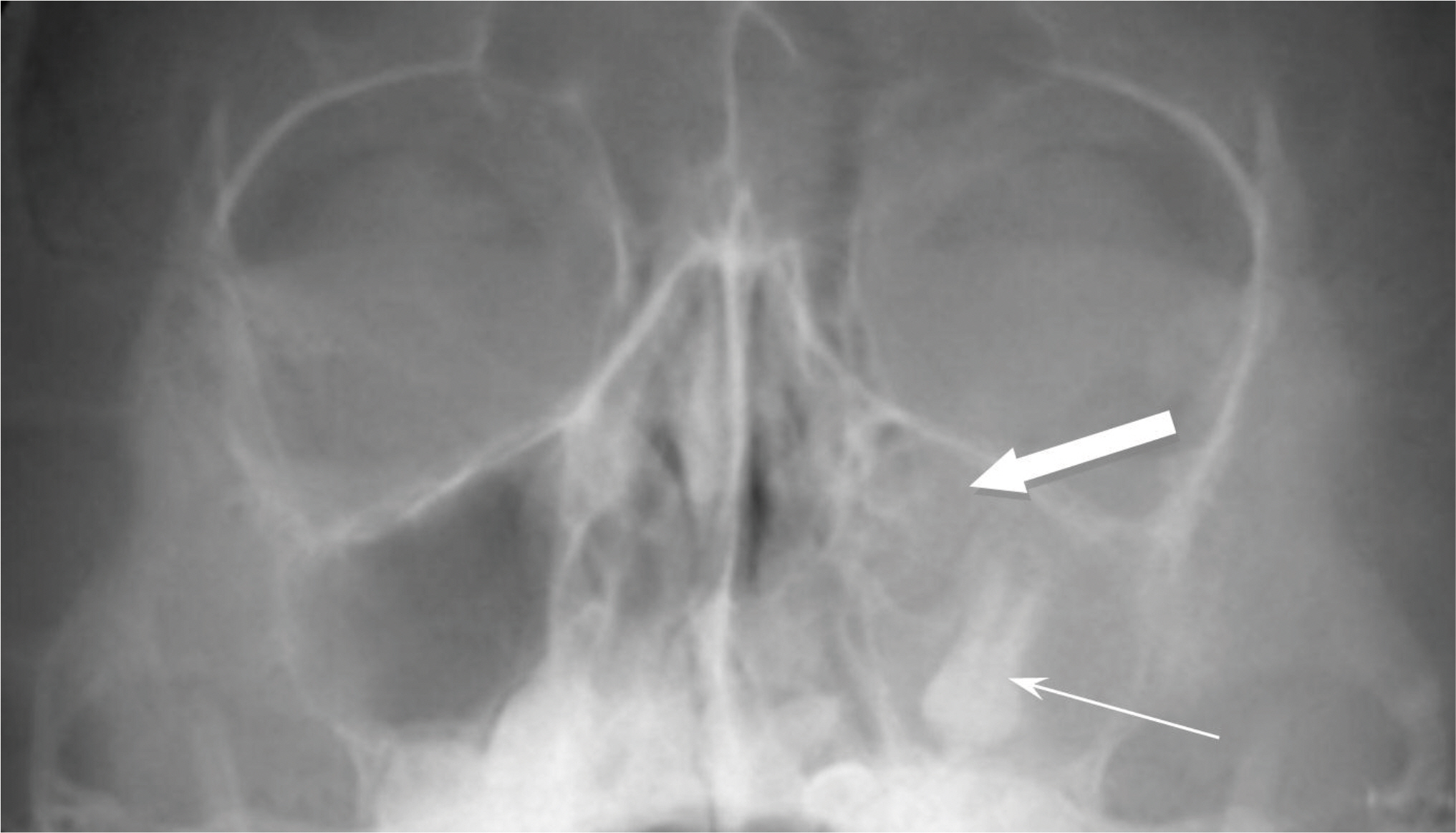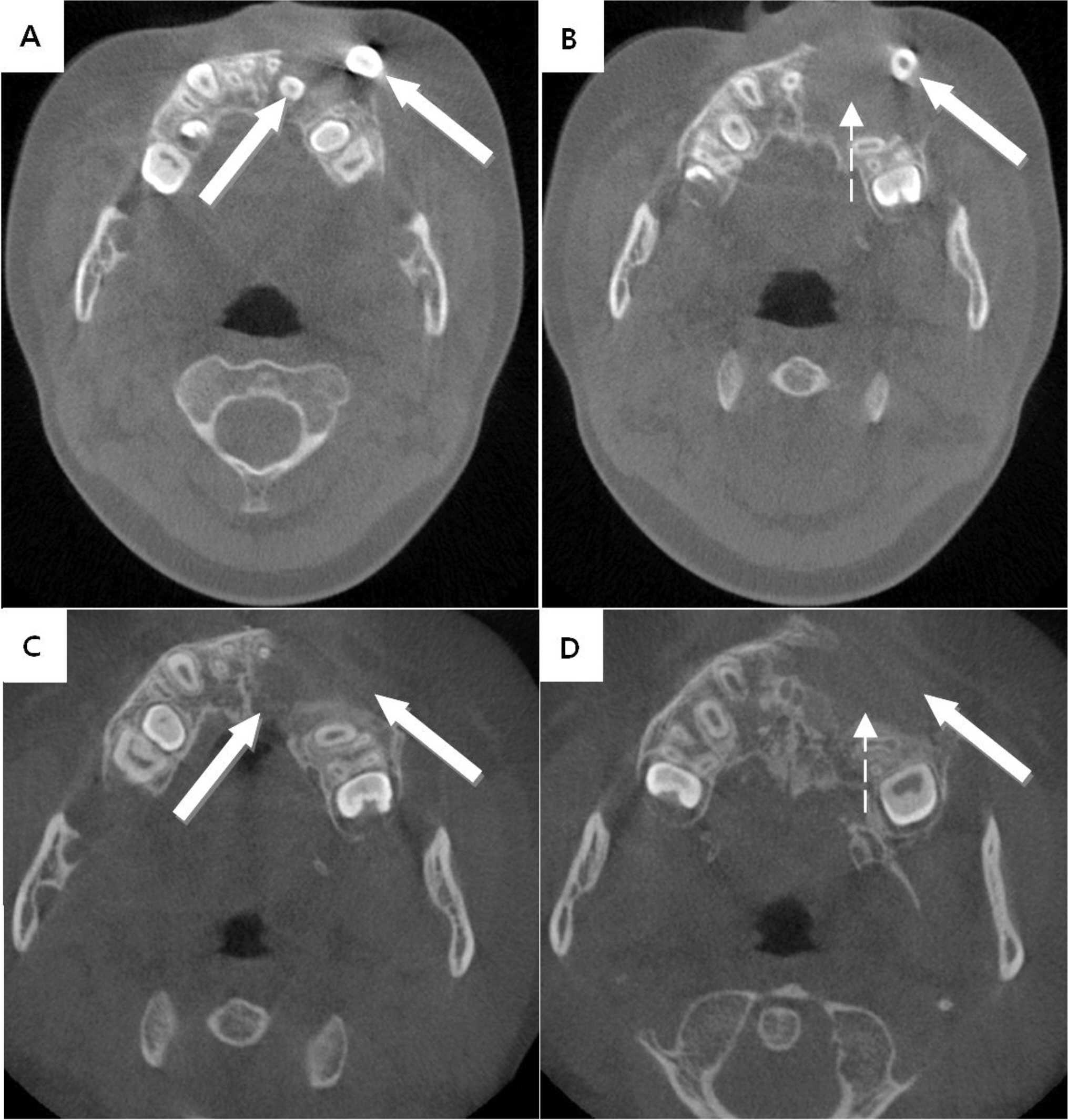Pediatr Infect Vaccine.
2015 Dec;22(3):201-205. 10.14776/piv.2015.22.3.201.
An Unusual Cause of Acute Maxillary Sinusitis in a 9-year-old Child: Odontogenic Origin of Infected Dentigerous Cyst with Supernumerary Teeth
- Affiliations
-
- 1Department of Pediatrics, Hallym University Sacred Heart Hospital, Hallym University College of Medicine, Anyang, Korea. kwangnamkim@naver.com
- 2Department of Oral & Maxillofacial Surgery, Hallym University Sacred Heart Hospital, Hallym University College of Medicine, Anyang, Korea.
- KMID: 2315686
- DOI: http://doi.org/10.14776/piv.2015.22.3.201
Abstract
- Acute maxillary sinusitis is a common disorder affecting children. Untreated acute sinusitis can develop into chronic sinusitis, and complications, such as orbital cellulitis or abscess, can occur. Maxillary sinusitis of odontogenic origin is not a well-recognized condition and is frequently missed in children. As an odontogenic source of sinusitis, the dentigerous cyst is one of the most prevalent types of odontogenic cysts, and it is associated with the crown of an unerupted or developing tooth. This report concerns a nine-year-old boy who was diagnosed with maxillary sinusitis originating from a dentigerous cyst with supernumerary teeth. The boy visited our pediatric clinic presenting with rhinorrhea and nasal obstruction and was initially diagnosed with maxillary sinusitis only. With antibiotic treatment, his symptoms seemed to improve, but after 2 months, he came to our clinic with left facial swelling with persistent rhinorrhea and nasal obstruction. Radiographic examinations of the sinuses were performed, and he was diagnosed with maxillary sinusitis originating from a dentigerous cyst with supernumerary teeth. After a surgical procedure involving the removal of the dentigerous cyst with supernumerary teeth, the symptoms of sinusitis gradually diminished. There are only very few cases in the pediatric medical literature that remind us that odontogenic origin can cause maxillary sinusitis in children. Our patient can act as a reminder to general pediatricians to include dentigerous cysts in the differential diagnosis of maxillary sinusitis.
MeSH Terms
Figure
Reference
-
1. Hong Y}. The diagnosis and treatment of sinusitis. Korean I pediatr Infect Dis. 2002. 9z14–8.2. Byun JH, Hwang IK, Park EK, Kang JW, Kim DS, Iang GC. A case of subdural empyema caused by sinusitis in a child. Korean J pediatr Infect Dis. 2014; 21:59–64.
Article3. American Academy of Pediatrics. Subcommittee on Mana—gement of Sinusitis and Committee on Quality Improvement. Clinical practice guideline: management of sinusitis. Pediatrics. 2001; 108:798–808.4. Maloney P, Doku H. Maxillary sinusitis 0f Odontogenic origin. Journal of the Canadian Dental Association. 1968; 34:591.5. Mehra P, Jeong D. Maxillary sinusitis of odontogenic origin. Current allergy and asthma reports. 2009. 92238–43.
Article6. Kretzschmar DP, Kretzschmar CIL. Rhinosinusitis: review from a dental perspective. Oral Surgery, Oral Medicine, Oral Pathology, Oral Radiology, and Endodontology. 2003; 96:128–35.
Article7. Haber R. Not everything in the maxillary sinus is sinusitis: a case of a dentigerous cyst. Pediatrics. 2008; 121:6203–7.
Article8. DS. Management of acute otitis media and acute sinusitis: clinical guidelines. Korean I pediatr Infect Dis. 2008; 15:100–7.9. Buyukkurt M, Omezli M, Miloglu O. Dentigerous cyst as—sociated with an ectopic tooth in the maxillary sinus: a report of 3 cases and review of the literature. Oral Surgery, Oral Medicine, Oral Pathology, Oral Radiology, and Endo—dontology. 2010; 109:67–71.
Article10. Leung AK, Kellner ID. Acute sinusitis in Children: diagnosis and management. Iournal of Pediatric Health Care. 2004; 18:72–6.11. Mehra P, Murad H. Maxillary sinus disease of odontogenic origin. Otolaryngologic Clinics of North America. 2004; 37:347–64.
Article12. Tournas AS, Tewfik MA, Chauvin P], Manoukian 1}. Multiple unilateral maxillary dentigerous cysts in a non—syndromic patient: a case report and review of the literature. Internatio—nal Journal of Pediatric Otorhinolaryngology Extra. 2006; 12:100–6.13. Avitia S, Hamilton IS, Osborne RF. Dentigerous cyst presenting as orbital proptosis. Ear, nose, & throat journal. 2007; 86:23.
Article14. Formby ML. The maxillary sinus. Proceedings of the Royal Society of Medicine. 1960; 53:163.
Article15. Brook 1. Sinusitis 0f Odontogenic origin. Otolaryngology—Head and Neck Surgery. 2006; 135:349–55.16. Martinez—Pérez D, Varela-Morales M. Conservative treat—ment of dentigerous cysts in children: a report of 4 cases. Journal of oral and maxillofacial surgery. 2001; 59:331–3.
Article17. Motamedj M, Talesh K. Management of extensive dentigerous cysts. British Dental Journal. 2005; 198:203–6.
- Full Text Links
- Actions
-
Cited
- CITED
-
- Close
- Share
- Similar articles
-
- A Case of Dentigerous Cyst Containing Multiple Teeth
- Dentigerous cyst associated with an impacted mesiodens: report of 2 cases
- A Long-term Follow-Up Case of Enucleation of Dentigerous Cyst in the Maxilla: Case Report
- Bilateral Maxillary Dentigerous Cysts in a Non-Syndromic Patient
- Supernumerary teeth in non-syndromic patients




